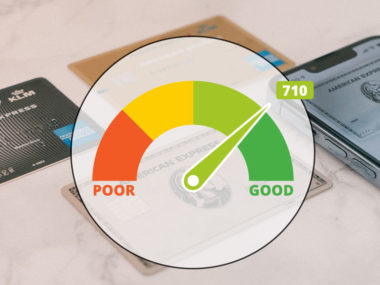If you have a credit score of 663, you have “Fair” credit. This is the second-to-lowest credit range on the FICO scoring model. These ranges are:
- Very Poor: 300 to 579.
- Fair: 580 to 669.
- Good: 670 to 739.
- Very Good: 740 to 799.
- Exceptional: 800 to 850.
Fair credit is never desirable. The good news is, you’re just seven points away from the “Good” credit range. If you can get into that range (and even higher into the “Very Good” and “Exceptional” tiers), you can begin to experience many of the powerful benefits of having good credit.
Below is an analysis of why your score is 663, what shortcomings this can create for your finances, and tips to get your credit trending in an upward direction.
Table of Contents
Why Your Credit Score Is 663
The first step in improving your credit is understanding it. If you don’t know why your score is at 663, it’s difficult to create a practical strategy to repair it.
This process starts with an analysis of what factors impact your FICO credit score. Below are seven different elements that can hurt or help your credit score in different ways.
As you read through the list, consider how each item has either helped or hindered your current score of 663. Look for positive financial activities that you should keep doing. Also, look for habits and behaviors that may have held you back from a higher score.
Payment History
Your payment history makes up 35% of your total credit score. That makes it the number one most important factor.
Consider your ability or inability to make consistent payments in the past. A habit of occasionally missing payments can be harmful over time.
Credit Utilization Ratio
Your credit utilization ratio is also very important. This is the percentage of your revolving debt that you’re currently using.
When you spend $1,000 on a credit card with a $10,000 limit, your credit utilization ratio for that account is 10%, which is good. If the ratio on your various accounts trends above 30%, it can start to damage your score.
Credit Age
The average age of your credit can also impact your score. As a rule, the older your credit is, the better off your score will be.
This can make it difficult to boost your score if you’re young. It can also lead to a lower score if you recently took out a loan or opened up a new line of credit.
Credit Mix
There are many different kinds of credit, such as:
- Student loans;
- Auto loans;
- Mortgages;
- Home equity lines of credit;
- Credit cards.
If you only have one or two of these, it can hold your score back. However, responsibly using several different kinds of credit can help raise your score.
Total Debt
Your non-revolving credit is also worth consideration. This is references money that you borrow all at once and then pay back over time, such as student loans or a mortgage.
If your total debt gets too high, it can be a sign to lenders that you can’t pay back borrowed money promptly. Too much debt will also lower your credit score.
Derogatory Marks
If you fail to make payments for an extended period, it will lead to a derogatory mark on your credit report. This includes anything from a delinquent account or a claim by a collection agency up to a repossession, foreclosure, or bankruptcy.
If you have a derogatory mark on your report, it could last for seven or even 10 years at a time. It’s important to resolve the issue and then send a goodwill letter asking the lender to forgive the offense and withdraw the mark proactively.
Hard Inquiries
Finally, a hard inquiry shows up on your credit report when a lender checks your credit before giving you a loan. This will temporarily lower your score for up to 12 months.
However, this is a normal part of doing business. As long as you don’t have several hard inquiries close together, this shouldn’t be a major concern.
By analyzing these seven areas, you can start to get a feel for why your score is in the Fair range. This is crucial information if you want to improve your credit in the future.
What Can You Do With a 663 Credit Score?
There are some things that you’re able to do with a Fair credit score. However, keep in mind that many of them will come with conditions and restrictions. At other times, you won’t be able to qualify for financial activities at all. Here are a few examples of both:
- Credit cards: If you have Fair credit, you can still get some credit cards.
- However, you may not be able to access rewards, could have a higher interest rate, or may have to pay an annual fee.
- Housing: It’s more difficult to be approved for housing with Fair credit.
- Landlords conduct credit checks and could hesitate over your lower score.
- You may be able to get a mortgage, but it would likely be at a much higher interest rate or with a higher down payment.
- Personal loans: Applying for auto, student, or other personal loans may be challenging with Fair credit.
- You may be denied a loan or have to look for a bad credit loan option that comes with more strings attached, such as higher interest rates or lower borrowing limits.
In comparison to these activities, if you have good credit you’ll gain access to many benefits like higher credit limits, lower security deposits, and greater negotiating power with lenders.
How to Improve a 663 Credit Score
If you have a score of 663, you should take steps to repair your credit to boost it into the Good credit score range and beyond. Fortunately, the jump to good credit isn’t very big and shouldn’t take too much effort. A few tips for ways to begin to repair your credit include:
- Requesting your free annual copy of your credit report and then reviewing it for errors or derogatory marks.
- Getting a good budget that helps you live within your means and make all of your payments on time.
- Using your revolving credit accounts while paying them off every month.
- Paying down your non-revolving credit and avoiding taking out more loans unless you absolutely need them.
- Working with a quality credit repair company to create a financial plan that helps you reach your short- and long-term goals as well as build good financial habits
These activities can help you fix your credit as soon as possible, but they will take some time. Once that begins to kick in, though, you should be enjoying the benefits of good credit soon afterward.
Image Source: https://depositphotos.com/





